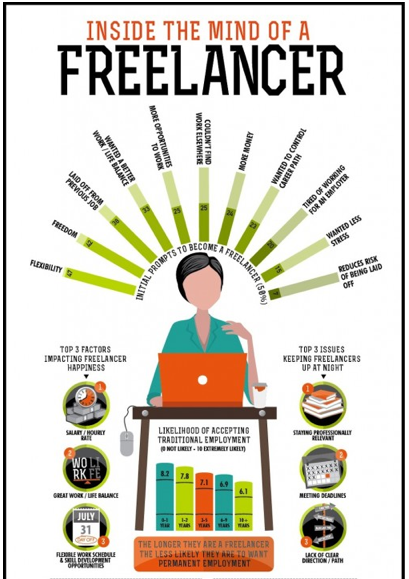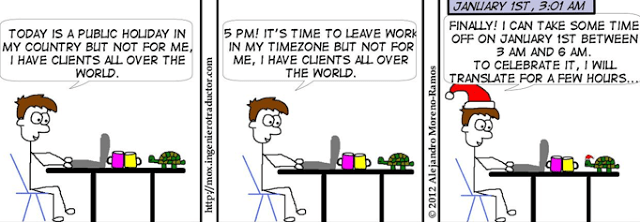Being self-employed is a tricky matter- sometimes it is even difficult to determine if you even are self-employed. Then there are all the other questions that come with it: what about incorporation? How do you manage billing clients? How do you promote yourself? What kind of hours should you work? Where do you even find work?
I’ve been freelancing (or, at times, self-employed) since 2009, and let me tell you, I’ve asked myself each and every question above- and tons more. I’ve also been around the block more than a few times, experiencing everything from the ups of being featured in national media to the lows of clients who won’t respond or pay on time.
Since the new year is around the corner and I know a lot of people are interested in starting freelancing, becoming self-employed or even finding where they fit somewhere in the middle, I thought I’d share my perspectives on just a few of the things I’ve learned in the last five years.
There’s a difference between freelancing and being self-employed.
If there is one thing I’ve learned since I started freelancing in 2009, its that there is a huge difference between freelancing and being legitimately self-employed. Freelancing is something I did in my spare time, while balancing the demands of a full-time job. When I first started freelancing, I wouldn’t necessarily say I was an industry expert; in fact, I was pretty green behind the ears, and I found most of my clients through third parties, including websites such as Elance, and talent scouts. Many of my clients were very small businesses or independent individuals with very tiny budgets, so they were happy to work with me despite my relative inexperience and, every once in a while, rookie mistake with a contract or billing. I didn’t make much money, certainly not enough to entertain making freelancing a full-time gig, and I managed about three clients at a time. I was very transparent with my clients about the time constraints of working with them when having a full-time job, and they had to accept it—or find someone else to work with.
As I developed more competence, I started upping my rates and finding more big name clients, both through word of mouth and more sophisticated self-promotion and client management techniques. I read industry news and learned that there was a whole world of people making a living out working for themselves- and I wanted to try my hand at it. After a few years of dipping my foot in the water freelancing, I took the leap and transitioned to being self-employed. I now had to pay my bills with the money I made “freelancing.” My clients became my bread and butter. I could no longer afford to make billing or contract mistakes. I hired an accountant and a lawyer to oversee my money and contracts. I began to keep my phone on 24/7, and much more liberally catered to my clients. In a word, I became self-employed: the time I spend on work, whether that’s prospecting for new clients, giving proposals to potential clients, or doing work for existing clients, is directly proportional to my income.

My services became more scalable and standardized.
When I was freelancing I took on tons of projects with different scopes and goals. Projects that had the same goal would take me varying amounts of time because I went about implementing them in different ways, or worked with clients from very different backgrounds. I also wasn’t organized or experienced enough to know that I should do a lot of the legwork up front, from asking for briefs to drafting strategies for approval. As I got better at what I did, and started to think about making a career for myself in this space, I realized that I had to get better and more efficient at what I was doing. The first step was standardizing my service offerings and finding a method that I can reuse with every client with whom I work. The second step was making things more scalable, so I could take on more work (and therefore make more money) without the quality of my services suffering. This took some trial and error, but if you have a few patient clients (or even friends who let you experiment on them for free like I did) you’ll be fine, just like I was!
Don’t incorporate just because it seems more “legit”- there are better reasons! Wait until you’ve found yours.
I didn’t incorporate as soon as I became self-employed. I actually incorporated when I was still freelancing! Not only are there tax breaks for business expenses such as travel and materials (such as a phone and computer), it makes accounting much, much easier, especially if you ever need to hire contractors or employees.

You’ll get different reactions when you say you’re self-employed, so be ready.
In the US, entrepreneurial individuals are usually well-received. When I go out and meet new people and explain what I do, I am usually met with accolades and find that I impress people with my work ethic and knowledge of my field. When I meet people from other places, however, and even some people in the States, I’m met with suspicion. I’ve gotten loads of different reactions, such as, “Oh, you mean you live off your parents?” to “You’re a blogger that actually doesn’t make money, right?” I’d recommend that you have a little elevator pitch ready when you get the “So, what do you do?” question so that people know that you’re doing something as important as any other job. Who knows, you might just find yourself with a new client if you nail it!
Do you freelance, or are you self-employed? What are other differences you think I left out, or do you think I’m completely off the mark?
Editor’s note: This story originally appeared here.




